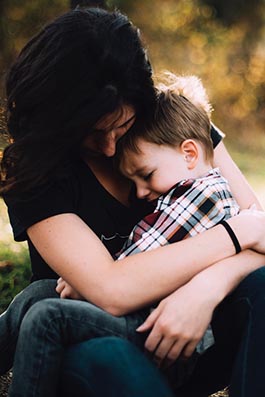Trouble With Discipline? Focus on Character, Not Punishment.
- THOMAS LICKONA
Eight ways to use misbehavior as an opportunity to build character.
 Parents often struggle with discipline, especially if they're focusing on when, whether, and how to punish. Kids, for their part, don't like getting punished. They're more likely to feel sorry for themselves rather than sorry for what they did. Attitude and behavior don't improve.
Parents often struggle with discipline, especially if they're focusing on when, whether, and how to punish. Kids, for their part, don't like getting punished. They're more likely to feel sorry for themselves rather than sorry for what they did. Attitude and behavior don't improve.
Those aren't the outcomes we want.
Is there a better way?
I think there is. It's discipline focused on building good character.
From this perspective, discipline has two jobs:
- to manage misbehavior in the situation at hand
- to promote our children's progress in developing character qualities like kindness, respect, responsibility, and self-control—traits that will serve them well throughout their lives
In this approach, we exercise authority but in a way that appeals to reason, gives kids a voice, and minimizes power struggles. We talk about "fair consequences" rather than "punishment."
Let's look at eight ways to use discipline to build good character.
1. Build a loving relationship. Stacks of studies show that a warm, caring, and responsive parent-child relationship is strongly linked to children's health, happiness, and character development. When children feel loved, they become emotionally attached to us. That attachment makes them more responsive to our authority and more receptive to our values.
2. Combine high expectations with strong support. Authoritative parents, research finds, set a high bar for appropriate behavior but do a lot to help their children meet those expectations. That means being a "character coach," patiently helping kids develop the micro-habits that make up a big virtue like "respect for others."
For example: When one of our first grandchildren was an exuberant 3-year-old, she would skip into a room and enthusiastically interrupt adult conversations by saying, "Excuse me! Excuse me! Excuse me!" Simply reminding her not to do this didn't work.
The solution was to teach her a positive "replacement behavior": to silently touch the nearest adult's arm as a signal that she wished to speak. That adult would then nod to acknowledge her. When the adult who was speaking finished, our granddaughter would then take her turn.
She good-naturedly complied. Establishing this habit took reminders and practice, as forming new habits always does, but eventually worked well enough to make it a family practice with the other grandchildren.
3. Be mindful of what might be causing problem behavior. Are they over-tired? Feeling stressed or down in the dumps? Irritable because of too much screen time? Coming off a hard day? Upset with a friend or sibling?
We show love and model empathy by acknowledging factors like these and cutting kids some slack without abandoning important standards ("I know you're tired and feeling grumpy, sweetie, but please remember your manners").
4. Ask for a "do-over" or "re-do." Many behavior lapses can be handled without drama by gently asking kids to show they know better ("Could you please say that more respectfully?").
5. The character conversation. A review of 76 studies in the US, UK, and Canada found that taking the time to make kids aware of how their actions affected others was a strong predictor of character outcomes like empathy, conscience, and moral reasoning.
This "character conversation" doesn't need to be long. For example, Sarah, age 2, pulled another little girl's hair hard enough to make her cry. Sarah's mother knelt down, looked her in the eye, and said with obvious feeling, "You hurt Amy! Pulling hair hurts. Never pull hair!"
6. The Thinking Chair. When they're told they have to take a time out for misbehavior, kids often get angry, cry, or sulk. However, they're less likely to do that if they understand its positive purpose. It's not to make them feel bad. It's to help them calm down if they need to, and then think about what they did that was not okay—and what they should have done instead. So don't call it "time out"; call it The Thinking Chair (or the "Think-It-Over-Feel Better" Space). You can explain it like this:
If I ask you to sit in the Thinking Chair, I want you to take some deep breaths, calm down, and then think about what you did and why that wasn't okay. If you like, you can hold one of your stuffed animals while you're thinking. Then when you're ready, come and tell me what you're going to do the next time.
7. Require restitution. All kids should learn an important life lesson: When you do something wrong, you should do something right to make up for it. Restitution goes beyond just saying you're sorry. It's showing you're sorry by doing something positive to heal a hurt or restore peace.
We can suggest an appropriate way to do that. For example:
You can make up for not being nice to your brother by reading him a story while I'm getting the dinner on.
Over time, we can shift more of the responsibility to them: "What do you think you can do to make things better?" Schools that use restitution have had success in reducing discipline problems.
8. Consider asking your child to help decide on a "fair consequence." It's certainly a legitimate exercise of our parental authority to establish a rule and consequence unilaterally: "If you hit, you must sit." "Be home by curfew or let us know the reason you're running late. Otherwise, lose driving privileges for a week."
But sometimes the consequence we think is fair doesn't seem fair to our child. Or it just doesn't work for some other reason.
In a recent talk I gave to parents, a father asked, "What do you suggest for punishments? I'm out of ideas." I replied:
First of all, I suggest not calling it a "punishment." Kids usually experience punishment as something we impose on them rather than something that resulted from their actions. I encourage you to talk instead about "fair consequences." Ask your child, "What do you think is a fair consequence—something that will really work to motivate you not to do this again?"
This changes the dynamic. It makes the conversation collaborative and character-focused. You're asking your child to share responsibility for coming up with a fair consequence and for making an agreed-upon plan to try.
If that plan doesn't work to your satisfaction, sit down and put your heads together again: "How can we make our plan work better? Do we need a different consequence? A strategy to help you remember our agreement?"
An example: Joe's story
Joe, age 11, promised to lock up his new bike, a birthday present, whenever he took it anywhere. He knew that bikes were being stolen in his community.
But soon after, in his hurry to warm up the pitcher for a ballgame, he left his bike leaning against the bleachers, unlocked. His father saw this when he arrived at the game and pointed it out to Joe, who apologized and promised to do better. But the next time, the same thing happened.
This time his father sat down with him and said, "Joe, I think we need a consequence that will help you remember to keep your promise to lock your bike. What do you think is fair?"
Joe thought about that and said, "That I should lose my bike for the rest of the week."
"Fair enough," his father said. That was hard for Joe; he loved his bike. But he didn't complain; he had proposed it.
When kids come up with a fair consequence, they're being their own judge and jury. In a very real way, they're disciplining themselves. That's a big step toward taking responsibility for their actions—and the kind of character they're developing.
 This is J. Fraser Field, Founder of CERC. I hope you appreciated this piece. We curate these articles especially for believers like you.
This is J. Fraser Field, Founder of CERC. I hope you appreciated this piece. We curate these articles especially for believers like you.
Please show your appreciation by making a $3 donation. CERC is entirely reader supported.

Acknowledgement
 Thomas Lickona. "Trouble With Discipline? Focus on Character, Not Punishment." Psychology Today blog (September 26, 2022).
Thomas Lickona. "Trouble With Discipline? Focus on Character, Not Punishment." Psychology Today blog (September 26, 2022).
Reprinted with permission from the author. Image credit: Photo by Jordan Whitt on Unsplash.
The Author

 Thomas Lickona, Ph.D., is a psychologist and educator who has been called "the father of modern character education." A professor of education emeritus at State University of New York, Cortland, he is the founding director of the Center for the Fourth and Fifth Rs (Respect and Responsibility) and is the author of How to Raise Kind Kids: And Get Respect, Gratitude, and a Happier Family in the Bargain, Character Matters: How to Help Our Children Develop Good Judgment, Integrity, and Other Essential Virtues and Educating for Character. He has also written Raising Good Children and co-authored Sex, Love and You. Tom Lickona is on the Advisory Board of the Catholic Education Resource Center. Visit his web site here.
Thomas Lickona, Ph.D., is a psychologist and educator who has been called "the father of modern character education." A professor of education emeritus at State University of New York, Cortland, he is the founding director of the Center for the Fourth and Fifth Rs (Respect and Responsibility) and is the author of How to Raise Kind Kids: And Get Respect, Gratitude, and a Happier Family in the Bargain, Character Matters: How to Help Our Children Develop Good Judgment, Integrity, and Other Essential Virtues and Educating for Character. He has also written Raising Good Children and co-authored Sex, Love and You. Tom Lickona is on the Advisory Board of the Catholic Education Resource Center. Visit his web site here.


